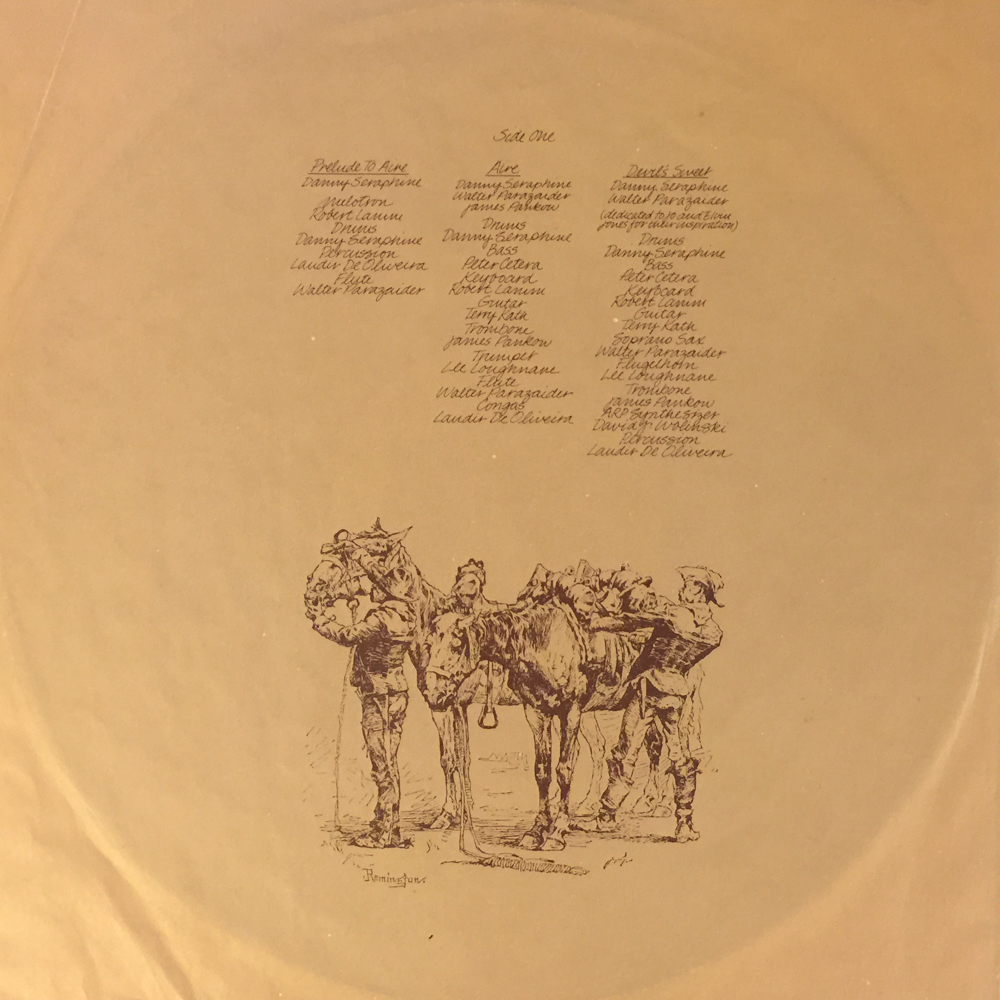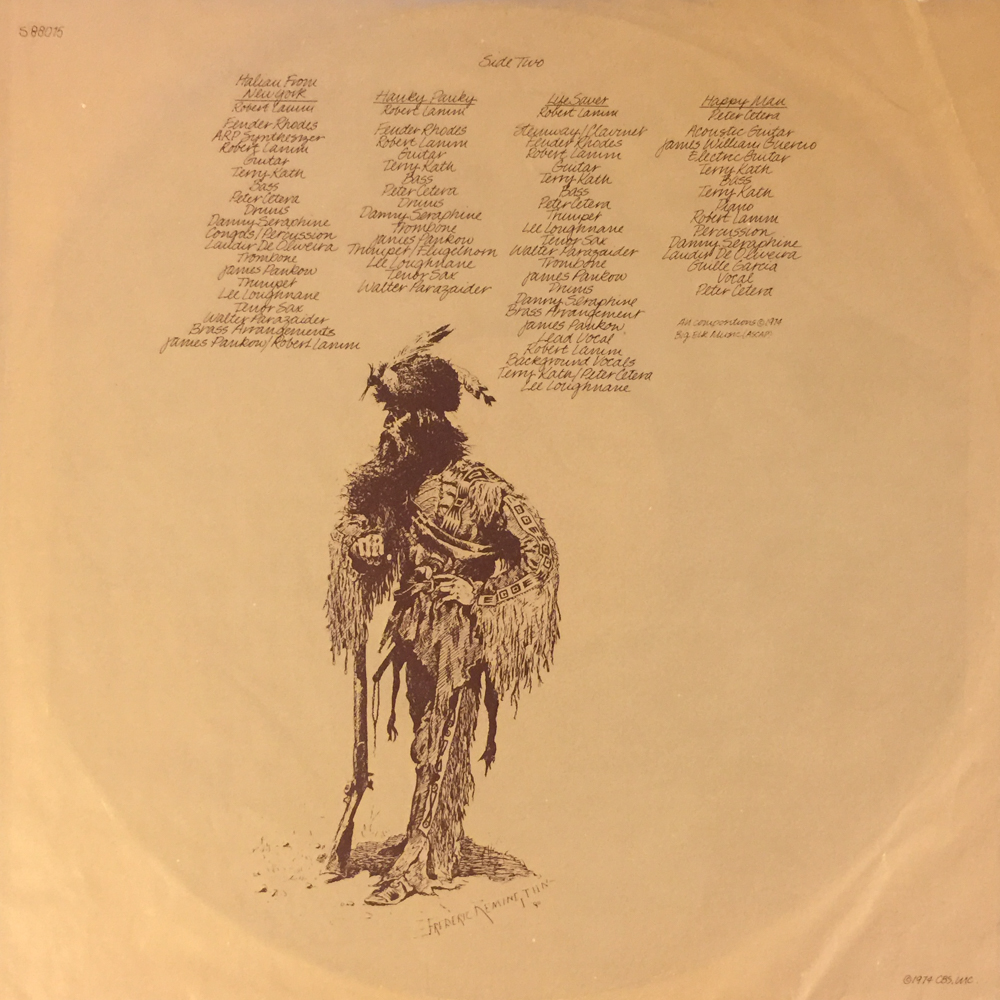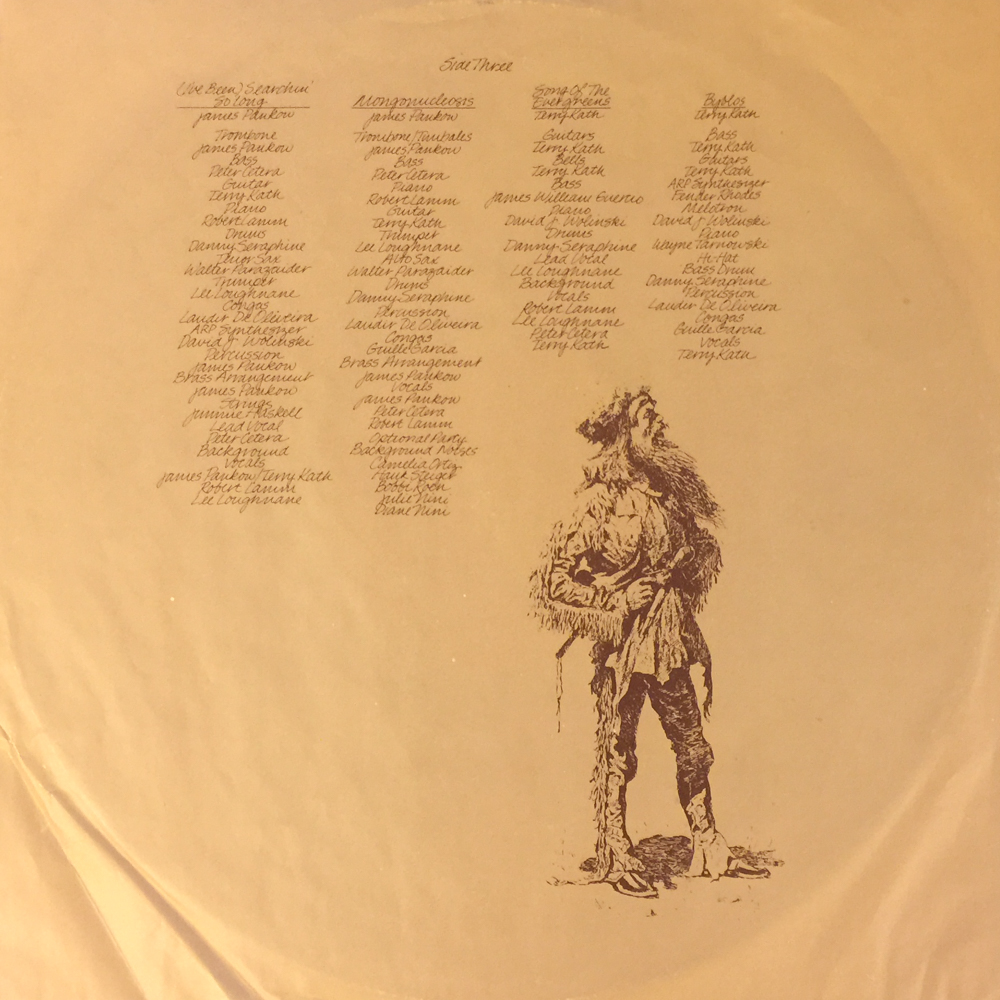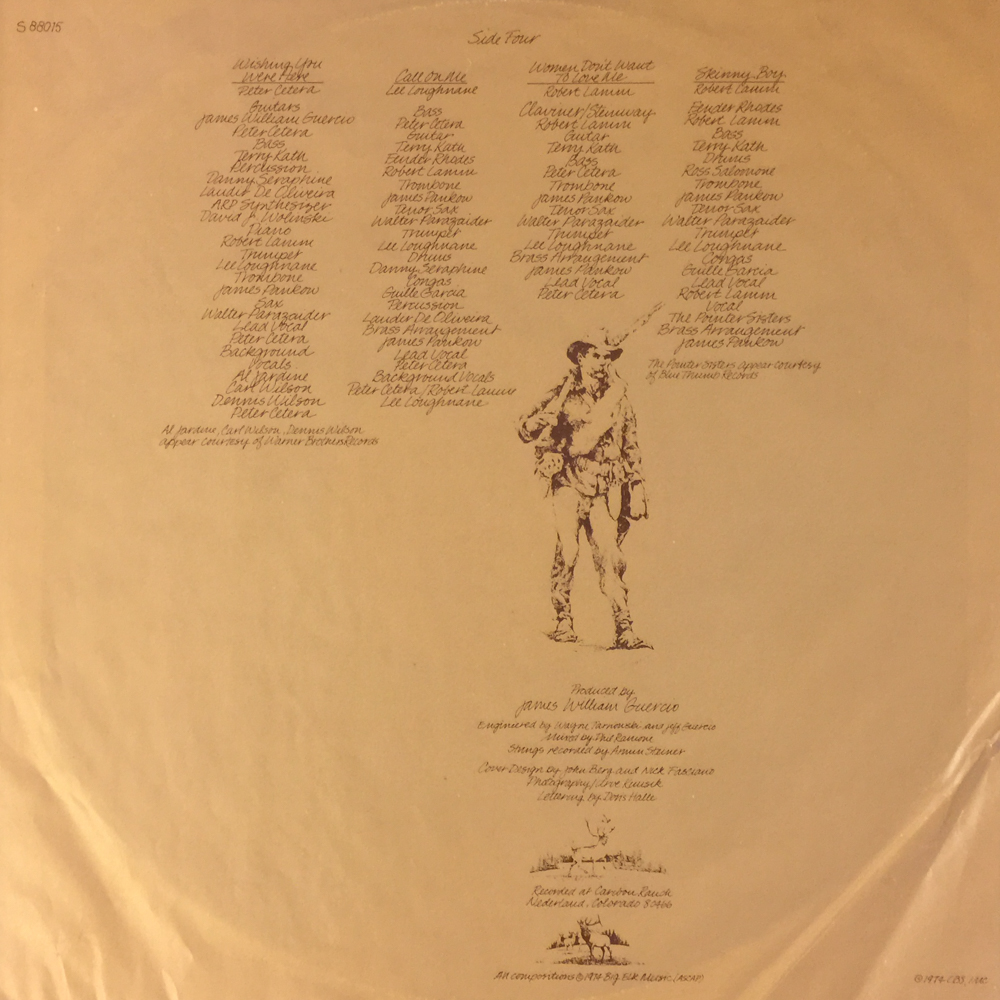Chicago on a Sunday - Chicago VII. The big surprise Featured
Written by Karl Erik SyltheThis time we've come to what is perhaps the most interesting of all the Chicago studio albums. Because there is a lot going on here, both on the record and in the scenes.
Since it was almost five years between the two previous articles in this series, I thought I had to compensate by posting two Sundays in a row this time. And nice feedback has not diminished motivation.
The Chicago VII double album was released on March 11, 1974, and the LP that is the basis for this review was acquired by me 2-3 years later, in the basement of the then dominant record store Playtime in Trondheim at the start of my studies. The album has perhaps the most appealing cover of all Chicago albums, with a distinct structure on the front and back. The style obviously reflects the environment in which the album was recorded, at Caribou Ranch, owned by producer James Guercio. This was Chicago's base for a while, and Chicago VI was recorded here as well. No clear urban style on the cover, but the music has!
It's time to take a peek at the backdrop for this album. After the bold debut of the three first albums, where they all were double albums, two single albums came in the form of Chicago V and Chicago VI. Not only were there single albums, but they also consisted of consistently shorter songs, unlike the often long songs with many and long instrumental passages. This change to short songs was probably a commercially motivated change both to facilitate singles and hits, and to adapt to the radio industry's preferences. But it probably contradicted parts of the foundation Chicago was based on. And then there was often a different level of involvement at this point among the various band members.
Against this backdrop, a part of Chicago had this time made it possible for them to gather after Chicago VI to play a purely instrumental, jazz-based album, among other things based on material they had played live on tours after Chicago VI.
But other parts of Chicago were unhappy and worried about this process and felt that it was not working well. In addition, there were concerns about the commercial potential of this jazz-influenced material. Peter Cetera and manager / producer James Guercico conspired, and a compromise was made. They agreed that the recorded material was too good to be scraped, but in addition they should complement with more traditional Chicago material, that is, according to the more hit-oriented concept of the last two albums. Thus, Chicago stumbled back to the concept of double albums, a little involuntarily.
And what an album! It is tempting to say that Chicago VII is at the same high level as the first three albums, although there is an obvious sideways shift. And where the first three albums had a musical span that was usually as big as the one on Chicago VII, the span was more integrated on the first three albums. On Chicago VII there is a clear two-division, where the first two pages minus the last 1-2 tracks on page B are jazz-dominated in something that we must modify to jazz rock, while the rest of the double album is more conventional pop / rock with - and with no Wind-section.
Chicago VII was thus the first album where inner musical contradictions were clearly materialized. It is thus the biggest milestone yet. But so far this is done in a great way, which does not compromise on quality. On the contrary, the quality in my ears is very much better than on the previous album, also on the part of the album that is more conventional pop/rock in Chicago incarnation. This song material is consistently much more interesting than on VI, although there are some exceptions.
Another distinctive feature of Chicago VII is that we get a couple of new songwriters, following the previous dominance of Robert Lamm / Terry Kath / James Pankow. Peter Cetera makes his debut as a songwriter, again as a result of his alliance with James Guercico. And also trumpeter Lee Loughlane debuts as a songwriter, with good help from Peter Cetera.

A look back at the Chicago Transit Authority
Since the Chicago VII album is a kind of milestone, and as I have already paid far more attention to this album than all the others, it may be appropriate to cast your eyes backwards, right up to where it all started. The Chicago Transit Authority (CTA) is still probably my default value for the best studio album, and by far the boldest. How does it compare to Chicago VII? Or vice versa?
The first thing that strikes me when playing Introduction is what a wonderful tune this is. And what a great live feeling the album holds. Whatever one might think of Chicago VII - Part 1, this live atmosphere has been lost. There is far more polished sound and also the arrangements are a little less raw and messy. At CTA there is more Rock`n Roll, clearly inspired by jazz. I still can't quite buy James Pankow's claims that there are no elements of jazz here, especially at the Chicago Transit Authority. And Robert Lamm's formulation on solo piano in the intro of Does Anyody Really Know What Time It Is completely overshadowing that the lyrics are a bit quasi-philosophical. The hornsection at Beginnings has the great combination of being precise but not overstretched.
Questions 67 and 68 are the first song where Peter Cetera is the dominant vocalist. And it's incredibly nice, completely free of the worries you might get a few years later when you know his pop ballads will take over. And at I`ma Man , he demonstrates why he is one of the pillars of Chicago's success.
The rest of the album is full of amazing rock songs, practically completely dead-end.
What makes CTA very different from Chicago VII is that the former is pure and raw rock, crystallized in half-length songs full of fun, combined with one of rock history's finest guitarists in free dressage and blank power. When combined with a fantastic blowing range with death contempt and steel precision, it becomes quite unbeatable.
I must therefore note that although Chicago VII is a very interesting album, it does not endanger the Chicago Transit Authority's place as the best studio album of all time. If another album appears later in the series that might threaten CTA, you'll find out by following the Chicago series on a Sunday !
Also read my full review of the Chicago Transit Authority

The sound of Chicago VII
The sound of Chicago VII is also very good, and it is claimed that this is because the equipment and recording technique used in James Guercico's studio at Caribou Ranch is consistently far better than the studios they have worked with in New York. Especially on the first two pages there is remarkably good sound.
Side A
- Prelude to Aire (5-)
Written by Danny Seraphine An intro dominated by Walter Parazider's flute along with the drum section, which from this album has also been expanded with Laudir de Oliveira. I have been a bit critical of some of Parazider's flute performance earlier, as opposed to his saxophone games. But here he plays very well.
An intro dominated by Walter Parazider's flute along with the drum section, which from this album has also been expanded with Laudir de Oliveira. I have been a bit critical of some of Parazider's flute performance earlier, as opposed to his saxophone games. But here he plays very well. - Aire (5)
Written by Seraphine / Parazaider / Pankow
This song was played live at concerts in conjunction with tours of Chicago VI. At a concert in August 1973 in Minneapolis, at the then half-year-old St. Paul Civic Center, according to writer Marshall Fine in The Minneapolis Starintroduced by James Pankow with the comment «We`re going to play something a little different. This is a new direction we are exploring". It may be debatable how fundamental new this is, even for Chicago. It's another step more towards jazz than most of the music they've made before, but not dramatically. And in this context, it is tempting to point out that the same James Pankow in his old days has repeatedly sneered at the use of the term jazz-rock about Chicago. He claims it is "rock with a hornsection". But that Aire must at least be characterized as Jazz-Rock I think few will contest.
I would argue that Aire is not primarily exciting and interesting because it is so fundamentally new to Chicago, but because it represents a diametrically opposite direction to some trends in the past Chicago VI, also this to a considerable extent initiated by James Pankow. And then it is also interesting because it represents the seed of an inner contradiction in Chicago between the more educated part represented by the windmill and possibly the drummer Danny Seraphine, and the more pop-oriented part. And here we obviously have a break time for Chicago. - Devil`s Sweet (5+)
Written by Seraphine / Parazides
Here we move even more heavily into jazz-rock territory, with parties where even at a weak moment can use the term pure jazz. Then we talk about the same type of approach as we for example. find at Blood Sweat & Tears a year later, on the album "In Concert". There are a couple of purely instrumental songs composed by others that are almost pure jazz. Or the jazz landscape we find on jazz drummer Ed Thigpen's Action reaction in 1974, which must probably be defined as jazz rock. This is one of the landscapes that was in the time, at that time. It is especially after the passage midway dominated by Robert Lamm's Fender Rhodes that the jazz dominance is fully realized.
For me, this track is one of the highlights of the album. And at the same time, a great whole is formed throughout this page A, which makes it obvious to think suite, just as we have found some examples in the first three studio albums.
Side B
- Italian From New York (6-)
Written by Robert Lamm An amazingly funny song, not least because of Robert Lamm's creative and somewhat computer-like use of synth. Robert Lamm has being duly demonstrating here that he does not stand behind the guys in the horn-section when it comes to the ability to create songs in a jazz-dominated landscape.
An amazingly funny song, not least because of Robert Lamm's creative and somewhat computer-like use of synth. Robert Lamm has being duly demonstrating here that he does not stand behind the guys in the horn-section when it comes to the ability to create songs in a jazz-dominated landscape.
Terry Kath also shines here, but not in a dominant or excessively virtuosic way. More in the way that he creates a guitar playing and a guitar solo that reinforces the rather unique character of this song. The horn-section comes in after the intro with some completely Chicago-themed event, with sounds and musical reasoning that is chewed out of the gold rush of the Chicago era. - Hanky Panky
Written by Robert Lamm
Italian From New York glides seamlessly into Hanky Panky . And this is somehow James Pankow's song, with his brilliant trombone solo. - Life Saver (5-)
Written by Robert Lamm
In an elegant way, Robert Lamm gets the music seamlessly turned into more pop / rock landscapes. And it marks the end of the pure instrumental songs, but that does not mean that the fun is over. A funny song with a slightly harsh and naïve basic scheme, but also a bit cheeky in some blower arrangements. Indeed there was a suite on side B also! - Happy Man (4)
Written by Peter Cetera
Peter Cetera gets it all down with a ballad in which he exposes the facet of his voice use that will later represent a battle core. But that at this stage is just nice and charming. This is Peter Cetera's debut as a songwriter in Chicago. Not quite one of my favorites, though. But the next tune by Cetera is much better ...
Side C
- Searching So Long. (4+)
Written by James Pankow One of many examples of synergy between James Pankow as songwriter and Peter Cetera as singer. Unlike the other songwriters, Pankow often used to write dedicated to a special singer, and that singer more often than not happened to be Peter Cetera. This is not one of my favorites either, It gets a bit hungry. But it must be admitted that it has a very fit ending.
One of many examples of synergy between James Pankow as songwriter and Peter Cetera as singer. Unlike the other songwriters, Pankow often used to write dedicated to a special singer, and that singer more often than not happened to be Peter Cetera. This is not one of my favorites either, It gets a bit hungry. But it must be admitted that it has a very fit ending. - Mongonucleosis (4+)
Written by James Pankow
Easier and a little Latin inspired, - I`ll give it that. And then we have to bear in mind that James Pankow is trying carefully as a vocalist. And later merits should show that it was about time! - Song of the Evergreens (5)
Written by Terry Kath
A very distinctive song, with crystal clear signature by Terry Kath. Here too we have a debutant as a vocalist, this time Lee Loughnane. And he also makes a good figure on this quirky song. - Byblos (5-)
Written by Terry Kath
When Terry Kath sings a song by Terry Kath, it is often a rather low-key and subtle song. So also this time, although he is even better other times. And the sound is not at the top here. Possibly a rash of "innermost track" and demanding tracking.
Side D
- Wishing You Were Here (5+).
Written by Peter Cetera When I listened to this for the first time in quite a few years approx. a week before writing, involuntary things went down his spine during the intro. And I who tend to be critical of Peter Cetera, at least when he gets away with cute ballads in free dressage, got an explanation problem. Because it is not to be denied that this is a really cute one. Maybe some old memories appeared in disguise...?
When I listened to this for the first time in quite a few years approx. a week before writing, involuntary things went down his spine during the intro. And I who tend to be critical of Peter Cetera, at least when he gets away with cute ballads in free dressage, got an explanation problem. Because it is not to be denied that this is a really cute one. Maybe some old memories appeared in disguise...?
A funny detail is that all the music was finished before the vocals were about to be added. And Cetera, who had obviously planned himself in the role of sole vocalist, discovered that he had a bit of a slip. The key was a bit too low for his voice, which meant he had to share the task with Terry Kath. In my ears, this is just one of the qualities of the song.
Wishing You Were Here is probably the clearest Cetera-dominated song to date, which at the same time announces a style change. But for now, everything is fine. Although it is a hypersoft song, it is an obvious example that quality trumps everything - including style. But then, things will get worse later ...
Another funny detail is that the Beach boys are joining in on this one. It happened a little by accident, since they were at Caribou Ranch at the same time and did their own recordings. So Peter Cetera is in the choir with Carl and Dennis Wilson, as well as Alan Jardine. Peter Cetera had always dreamed of being a Beach Boy - now it became true. - Call on Me (4)
Written by Lee Loughlane
This is Lee Loughlane's second debut on this album - this time as a songwriter. Although there is possibly a truth with modifications, `cause he got massive help from Peter Cetera, both for text and melody, after the draft had been doomed by some colleges in Chicago. The song was decent, but not among the ones I appreciate highly. - Woman Don`t Want To Love Me (5-)
Written by Robert Lamm
The combination of Robert Lamm as a songwriter and Peter Cetera on vocals has used to work well. It does this time as well, in a song that grates a bit in comparison to some of the slightly more pop-oriented fabric. Kudos to a creative and abrupt ending, which is on the same street as "We can make it hap ..." on Dialogue part II - Chicago V - Skinny Boy (5)
Written by Robert Lamm
This song is a direct theft! Theft of the title track for Robert Lamm's solo album at the time, by the way, the only one in nearly twenty years, before the next appeared in 1993. With his great chorus of Pointer Sisters, this funky, soul-inspired song is very atypical Chicago. And just as worthy of a worthy closing song on a Chicago album that goes a little new ways.
Also read the other Chicago series recordings on a Sunday:
- Chicago on a Sunday - Chicago Transit Authority
- Chicago on a Sunday - Chicago II
- Chicago on a Sunday - Chicago III
- Chicago on a Sunday. - "Chicago IV", Chicago Live at Carnegie Hall.
- Chicago on a Sunday - Chicago V
- Chicago on a Sunday - Chicago VI. The first warnings
And the article where it all started:


Karl Erik Sylthe
Redaktør i Audiophile.no
This email address is being protected from spambots. You need JavaScript enabled to view it.Latest from Karl Erik Sylthe
- Rega Mercury og Solis – HighEnd forsterkersett med britisk tradisjon
- Bowers & Wilkins og McLaren utvider partnerskapet med den nye Px8 S2 McLaren Edition
- TEST: Pixel 10 Pro XL – Googles flaggskip i KI-ens tidsalder
- TEST: Cyrus 40 – elegant og kompakt HiFi i forsiktig HighEnd-terreng
- PLATESMAKING 24 - 2025. Nye- og gamle helter
- KLH Audio med ny distributør i Norge – med tre nye høyttalermodeller
- Lumin X2 – nytt flaggskip med egenutviklet DAC-teknologi
- TEST: Sennheiser Momentum 4 - høy kvalitet til en svært moderat pris
- TEST: JBL Tour One M3 – et friskt pust
- TEST: Sonos Ace - gigant i ukjent terreng?

